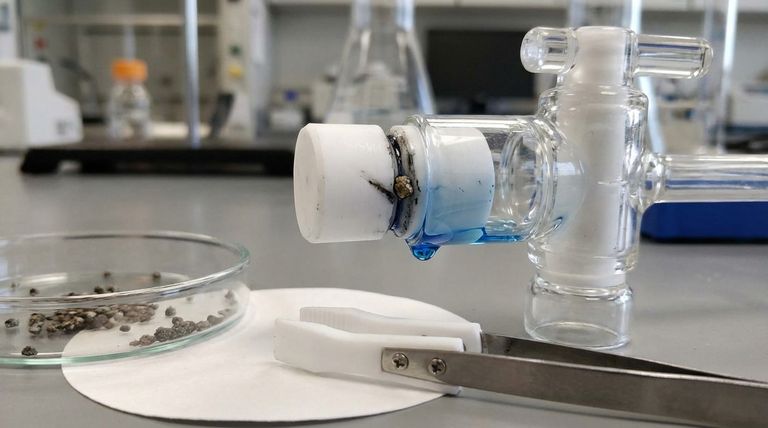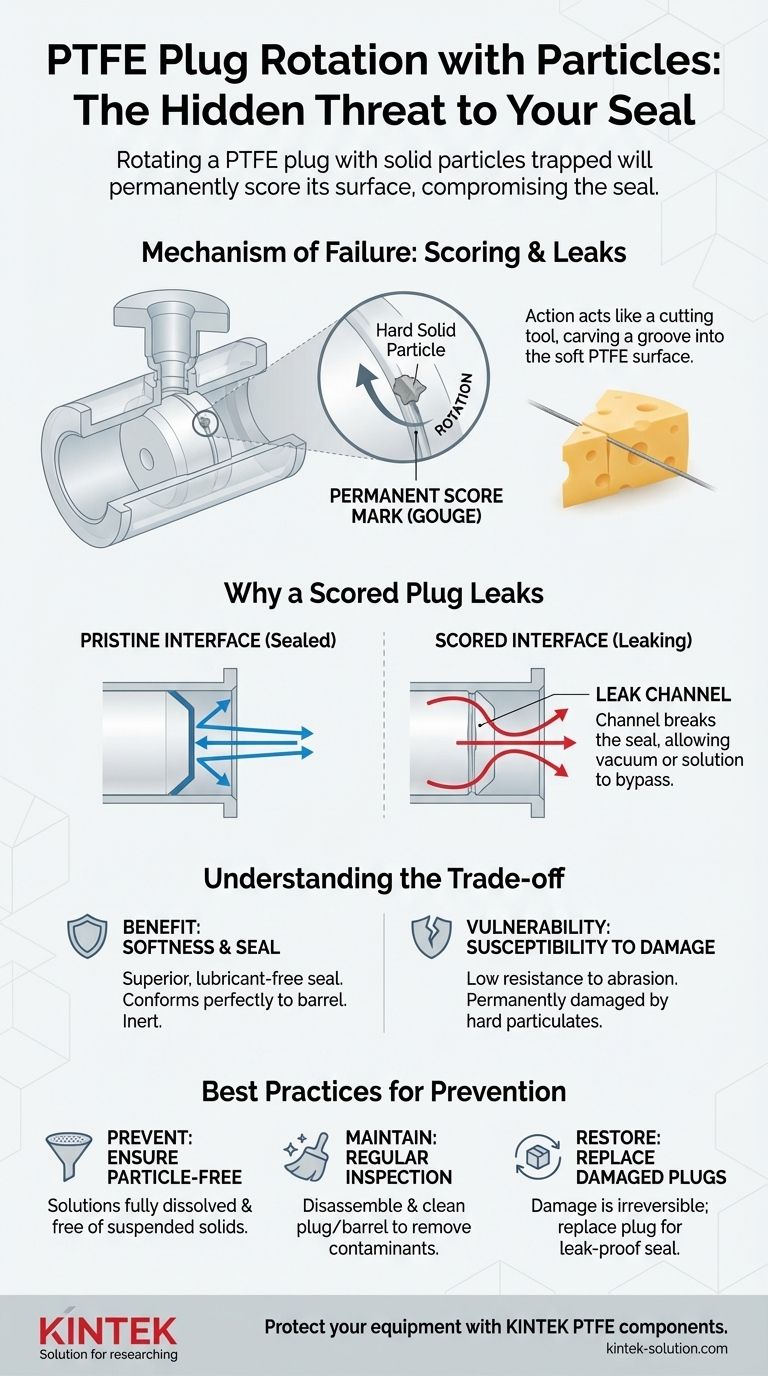Rotating a PTFE plug with solid particles trapped inside will permanently score its surface, creating a channel that compromises the seal. This damage is irreversible and will almost certainly cause the component, such as a stopcock or valve, to leak.
The core issue lies in a fundamental trade-off: The very softness that allows PTFE to create a superior, lubricant-free seal also makes it highly vulnerable to physical damage from hard particulates. Preventing leaks is therefore a matter of maintaining a pristine, particle-free interface.

The Mechanism of Failure: Scoring and Leaks
How Scoring Occurs
Polytetrafluoroethylene (PTFE), commonly known by the brand name Teflon, is a relatively soft material. When a hard, solid particle is caught between the plug and the barrel, rotating the plug drags this particle across the PTFE surface.
This action acts like a cutting tool, carving a distinct groove or score mark directly into the plug. The damage is a physical gouge in the sealing surface.
Why a Scored Plug Leaks
A properly functioning PTFE plug relies on a perfectly smooth, uninterrupted surface to press against the barrel, creating an impassable barrier for liquids and gases.
A score mark introduces a channel that breaks this seal. This tiny trench creates a pathway for material to bypass the intended sealing point, resulting in a leak. Even a microscopic score can be enough to compromise a vacuum or allow a solution to drip through.
Understanding the Material: PTFE's Double-Edged Sword
The Benefit of Softness: Creating a Perfect Seal
PTFE plugs became an industry standard because their chemical inertness and slight malleability allow them to conform perfectly to the smooth glass or metal barrel of a valve.
This creates an exceptionally tight seal without the need for grease, which can contaminate chemical reactions or cause traditional glass stopcocks to seize.
The Vulnerability of Softness: Susceptibility to Damage
The disadvantage of this softness is a low resistance to abrasive damage. Unlike a hard glass stopcock, which might grind a particle down, a PTFE plug will be permanently damaged by it.
Think of it like trying to cut a block of firm cheese with a wire. The hard wire (the solid particle) easily slices through the soft cheese (the PTFE plug), leaving a clean cut behind.
Understanding the Trade-offs
The Advantage Over Glass
PTFE components solved a major problem with older, all-glass stopcocks, which required constant lubrication. This grease could dissolve into solvents, contaminate sensitive reactions, and make disassembly difficult.
The Inherent Limitation: Particulate Intolerance
The trade-off for this grease-free convenience is an extreme intolerance for solid matter. Any particulate in your system—be it undissolved solute, a precipitate from a reaction, or even external dust—is a direct threat to the integrity of the seal.
Common Sources of Damaging Particles
Be vigilant for solids originating from reaction mixtures, such as precipitates or crystallization products. Dust from the lab environment or fragments from other equipment can also become lodged in the valve if proper care is not taken during assembly.
Best Practices for Preventing Damage
To ensure the reliability and longevity of your equipment, proactive prevention is the only effective strategy.
- If your primary focus is preventing leaks during an experiment: Always ensure solutions are fully dissolved and free of suspended solids before allowing them to pass through a PTFE valve.
- If your primary focus is equipment longevity: Regularly disassemble, inspect, and clean the plug and barrel with an appropriate solvent to remove any potential contaminants before they can cause damage.
- If you have already discovered a scored plug: The damage is permanent, and the only reliable solution is to replace the PTFE plug to restore a leak-proof seal.
Ultimately, treating PTFE components with care is the key to leveraging their advantages while avoiding their inherent vulnerabilities.
Summary Table:
| Aspect | Impact on PTFE Plug |
|---|---|
| Material Property | Softness allows for superior, grease-free seals but is highly vulnerable to abrasion. |
| Result of Rotation with Particles | Permanent scoring occurs, creating a leak channel. Damage is irreversible. |
| Primary Risk | Compromised vacuum or pressure integrity, leading to experimental failure or contamination. |
| Prevention Strategy | Ensure solutions are particle-free; regularly inspect and clean plugs and barrels. |
Protect your experiments and equipment with precision-engineered PTFE components from KINTEK.
If your operations in the semiconductor, medical, laboratory, or industrial sectors demand reliable, leak-free performance, our custom-fabricated PTFE seals, liners, and labware are designed for excellence. From prototypes to high-volume orders, we prioritize precision production to meet your exact specifications.
Don't let seal failure compromise your results—contact us today to discuss your needs and benefit from our expertise in durable, high-performance PTFE solutions.
Visual Guide

Related Products
- Custom PTFE Parts Manufacturer for Teflon Parts and PTFE Tweezers
- Custom PTFE Parts Manufacturer for Teflon Containers and Components
- Custom PTFE Sealing Tapes for Industrial and High Tech Applications
- Custom PTFE Sleeves and Hollow Rods for Advanced Applications
- Customizable PTFE Seals Filter Holders for Versatile Applications
People Also Ask
- What fabrication services are available for PTFE? Shearing, Stamping, Laser Cutting, Molding & Machining
- What challenges arise when machining PTFE (Teflon)? Overcome Softness, Heat, and Instability
- What factors should be considered when choosing between Nylon and PTFE? Select the Right Material for Your Application
- What are the main applications of PTFE type Teflon? Unlock Its Versatility for Your Industry
- What finishing techniques are effective for machined Teflon parts? Achieve Functional Performance and Dimensional Stability



















